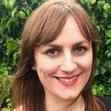Emily Cullen's Blog, page 5
October 14, 2019
Belfast Here We Come!
I'm typing this on the Enterprise train bound for Belfast where I'm especially looking forward to reading tomorrow afternoon at 3:30pm in Belfast Central Library. Why am I so excited about reading in Belfast, in particular? Because a number of the poems in my new collection, Conditional Perfect, are set in that city in 1792 where ten harpers - six of them blind, including one female - gathered in the Exchange Rooms to perform their music at the Belfast Harpers Assembly. A watershed moment in the preservation of our native Irish music, thanks to Edward Bunting who transcribed and notated the tunes each of the harpers performed, tomorrow's reading will hold special significance for me and I'm looking forward to reading my monologues in the voices of some of the harpers, such as Denis Hempson and Rose Mooney. I'm also looking forward to reading alongside Michael Whelan and Simon Lewis for the first time - our reading in Galway was postponed until November due to Storm Lorenzo! The reading tomorrow is free admission and all are welcome. Tell your Belfast friends to come along!
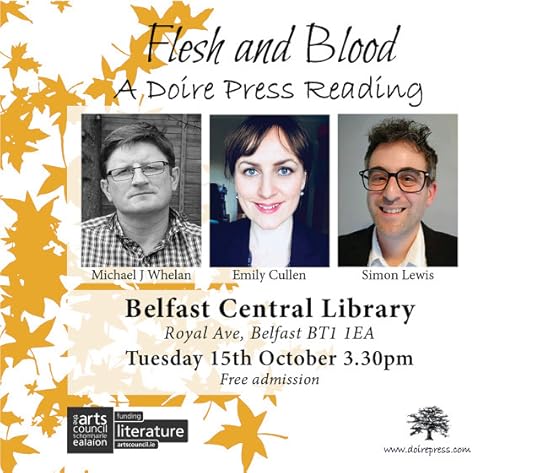
Published on October 14, 2019 10:39
October 2, 2019
Taking poetry on the road with Doire Press Reading Tour, 'Flesh and Blood'
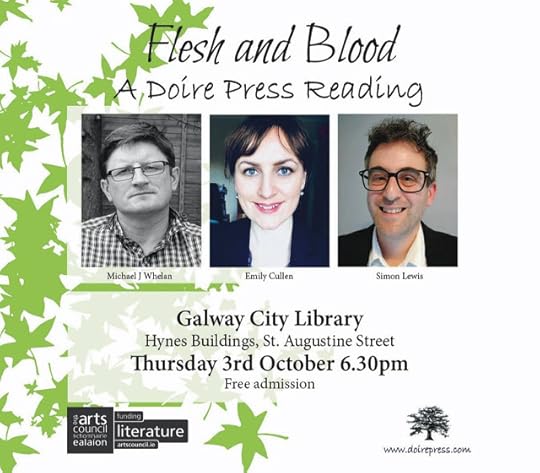
The FLESH AND BLOOD Doire Press Reading Tour, featuring poets Michael Whelan , Simon Lewis and myself, begins tomorrow (Thursday, 3rd Oct) in Galway at 6:30pm in the City Library. The event is free and everyone is welcome! There will be wine too, I'm told. The tour will continue on to Belfast, Dublin and Cork. Dates, venues and times below and the short description from the FLESH AND BLOOD page on Facebook:
GALWAY CITY LIBRARY - Thursday 3rd October, 6.30pm
BELFAST CITY LIBRARY - Tuesday 15th October, 3.30pm
DUBLIN, THE VINTAGE ROOM, WORKMANS CLUB - Wednesday 23rd October, 6.30pm
CORK CITY LIBRARY – Wednesday, 6 November, 6:30pm
You are all very welcome to come and hear Doire Press poets Emily E. Cullen, Simon Lewis and Michael Whelan read from their new collections, as they tour Ireland with FLESH AND BLOOD. Hear some fine words, and enjoy a glass of wine with us at Galway City Library!
Reading from CONDITIONAL PERFECT Emily Cullen travels the veins of being both artist and mother in an increasingly technological landscape, from the sublime mundanity of ordinary life, to the legacy and beauty of the harp; in AH, MEN!, Simon Lewis explores what it means to be a man in a culture where roles and expectations have shifted, with poems that speak of a desire to connect and its frustrations, of relationships with friends and family, and the small ministries of love; soldier-poet Michael J. Whelan reveals the personal losses and futility of war in RULES OF ENGAGEMENT, which visits past conflicts and current bloodshed, rich also with a revelatory beauty in nature. From music, to encounter, to peace, these three distinct voices talk of their intimate experience of the world, and reach to the heart of things.
Published on October 02, 2019 05:04
October 1, 2019
My third collection of poetry is officially launched
 Conditional Perfect is published by Doire Press
Conditional Perfect is published by Doire PressThis blog has been in extended hibernation, however, all that is about to change. The gloriously busy daily life of the past two enjoyable years, during my tenure as Programme Director of Cúirt International Festival of Literature, made the prospect of regular posts impractical. As we usher in the Winter on this first day of October, with all the grace we can muster, it seems like the perfect time to gratefully take stock of all that's been happening of late, especially during the milestone month of September. So, it's timely to return here with renewed vigour; there are multiple reasons for excitement and a few good excuses for celebration too!
On the poetry front, I was delighted when my poem – a monologue in the voice of 1792 harper, Denis Hempson – was shortlisted for the ‘Pastimes – Past Times’ Summer poetry competition organised by Strokestown International Poetry Festival as part of National Heritage Week. On Saturday, 17th August, we gathered in Strokestown Library to read our shortlisted poems in front of a warm, receptive audience (there were over 200 entries to the competition, which was judged by poet, James Harpur, with 14 of us shortlisted). Congratulations to Annette Skade, Rory Duffy and Siún Carden who won first, second and third prize respectively. You can read all of the shortlisted poems, including the three beautiful prize-winners, here.
The month of August also saw me refining and polishing the manuscript for my third poetry collection, Conditional Perfect, and eventually letting it go and submitting to my publishers at Doire Press . It's always a fraught time for any writer, but John and Lisa have been wonderful throughout and have made the process an easy and seamless one. I’m still in the afterglow of the book’s official launch, just three days ago in Galway City Museum with more on that and some pics to follow below shortly.
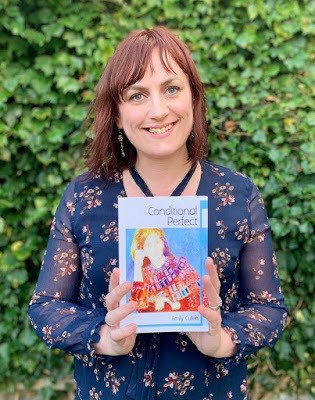 Elated, just after receiving the first copy of Conditional PerfectAs many of us parents and educators know, September heralds the beginning of the real year! We had all the usual flurry of excitement as my toddler began his ECCE year at his crèche and my older boy started in third class. (He also turned 9 in September - which I still can't believe - and our modest back lawn is now colonised by a substantial trampoline!). No sooner were both my boys getting settled back to school when I also found myself returning to the educational sphere, to NUI Galway campus to teach undergraduate seminars in Creative Writing (to second-year English students) and ‘Landscape, Literature and Culture’ to visiting students from the U.S. I’m now into my third week and what a privilege it is to be back among bright young people who're eager to learn and full of curiosity, with so much of life ahead of them. One of the contemporary sonnets we looked at last week, which piqued the students' interest, was Marilyn Nelson's powerful 'How I Discovered Poetry'. The exchange students and I are exploring the Idea of the West, landscape-as-text and contrasting W.B. Yeats's symbolic use of the land with Patrick Kavanagh's earthy representations. We continue to be fascinated by polymath,
Tim Robinson's
mapping of Connemara and his unique methodologies.
Elated, just after receiving the first copy of Conditional PerfectAs many of us parents and educators know, September heralds the beginning of the real year! We had all the usual flurry of excitement as my toddler began his ECCE year at his crèche and my older boy started in third class. (He also turned 9 in September - which I still can't believe - and our modest back lawn is now colonised by a substantial trampoline!). No sooner were both my boys getting settled back to school when I also found myself returning to the educational sphere, to NUI Galway campus to teach undergraduate seminars in Creative Writing (to second-year English students) and ‘Landscape, Literature and Culture’ to visiting students from the U.S. I’m now into my third week and what a privilege it is to be back among bright young people who're eager to learn and full of curiosity, with so much of life ahead of them. One of the contemporary sonnets we looked at last week, which piqued the students' interest, was Marilyn Nelson's powerful 'How I Discovered Poetry'. The exchange students and I are exploring the Idea of the West, landscape-as-text and contrasting W.B. Yeats's symbolic use of the land with Patrick Kavanagh's earthy representations. We continue to be fascinated by polymath,
Tim Robinson's
mapping of Connemara and his unique methodologies. With my book, Conditional Perfect, still only hot off the press I had the honour of sharing some of my new poems for the very first time with a lovely audience at the 42nd Clifden Arts Festival on Wednesday, 18th September. Reading along side poet, Richard Halperin , the wonderful Tony Curtis was our master of ceremonies and treated us to musical interludes during the event. Poets, Gerry Hanberry and Moyra Donaldson also read that afternoon and it was a memorable occasion. My sincere thanks again to Brendan Flynn, Des Lally and all at Clifden Arts Festival for inviting me to read and congrats on another stellar line-up this year.
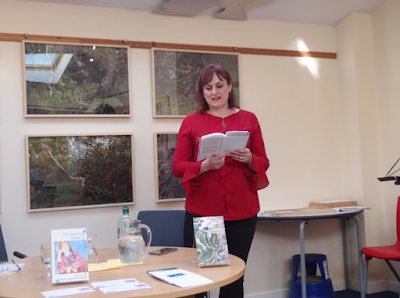 Reading at Clifden Library as part of Clifden Arts Festival
Reading at Clifden Library as part of Clifden Arts Festival
 Poet and musician, Tony Curtis at Clifden Arts FestivalJust a few days later, on Saturday, 21st, I had the pleasure of reading in
The Bookworm bookshop
in Thurles as part of the Féile Flipside programme of cultural events. With true Tipperary hospitality, owner John Butler gave me a warm welcome, not to mention some delicious coffee. In the days leading up to the launch of Conditional Perfect, Charlie McBride of The Galway Advertiser met me for a coffee and a chat about the book which you can read in this week's edition of the newspaper online here.
Poet and musician, Tony Curtis at Clifden Arts FestivalJust a few days later, on Saturday, 21st, I had the pleasure of reading in
The Bookworm bookshop
in Thurles as part of the Féile Flipside programme of cultural events. With true Tipperary hospitality, owner John Butler gave me a warm welcome, not to mention some delicious coffee. In the days leading up to the launch of Conditional Perfect, Charlie McBride of The Galway Advertiser met me for a coffee and a chat about the book which you can read in this week's edition of the newspaper online here. Then, finally, last Saturday, with the book's poems proving to be popular with audiences and readers alike (two were also featured on the Poethead website and shared widely on Twitter and Facebook – thank you Christine Murray ), it was high time to officially launch Conditional Perfect! And so we gathered at Galway City Museum at noon last Saturday, 28thSeptember to give the book its send-off into the world, with Galway poet and musician, Gerry Hanberry , kindly doing the honours. A huge thank you to Gerry for eloquently launching Conditional Perfect, to my gifted friend, Pat Jourdan for her beautiful art which graces the book's cover, to Brendan McGowan, Damien Donnellan and the staff of Galway City Museum , to John Walsh and Lisa Frank and to everyone who took the time to come out and support me on the day. Any slight nerves I had beforehand were quickly banished by the abundant good vibes and collective joyful wishes in the room. Conditional Perfect is now launched and will hopefully travel far and wide and bring pleasure to many many readers. Here are some endorsements for the collection:
‘Discursive, widely-travelled, at once cerebral and lyrical, Emily Cullen’s Conditional Perfect is an ambitious and beautiful work. Here are the streets of Grattan, Elgin and Canning in Melbourne, motherhood and its mysteries, the indictment of victims by defending barristers, the ancient harpists of Belfast; all creating one great embracing, forceful charge in poem after poem. Witty and sardonic too, her poems of mirrors and reflections bring us back to an instantly recognisable human ordinariness. This collection, a Cullen masterpiece, will certainly beguile the reader with its astonishing range and poise.’— Thomas McCarthy, author of Prophecy (Carcanet)
‘Emily Cullen’s third collection takes the reader on journeys from Ireland to Australia and back, and to the 1792 Harpers’ Assembly in Belfast. Her poems are “freighted” in social realities, but always seek out the “poise” that comes with experience and empathy, the harmony—both literal and figurative—of an open mind and ear that are attuned to “the music of what happens”.’— Lorna Shaughnessy, author of Anchored (Salmon Poetry)
‘Emily Cullen can wave a child off to school while encompassing the world’s fears, find the seamless continuum between politics and motherhood and surprise us with the music of her lines all at the same time. In these pages too you will meet the Belfast Harpers, among them blind Rose Mooney, from whom you’ll learn it’s the music that lasts beyond what anyone can see.’— Kevin Brophy, author of Look at the Lake (Puncher & Wattmann)
You can order a copy from the Doire Press website here. And now, a few of those launch pics!
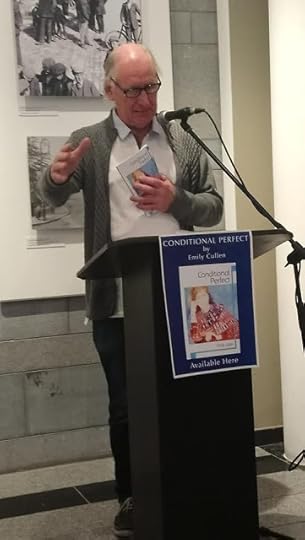 Gerry Hanberry launching Conditional Perfect
Gerry Hanberry launching Conditional Perfect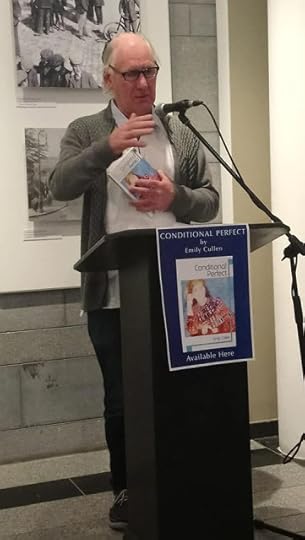 Gerry Hanberry launching Conditional Perfect
Gerry Hanberry launching Conditional Perfect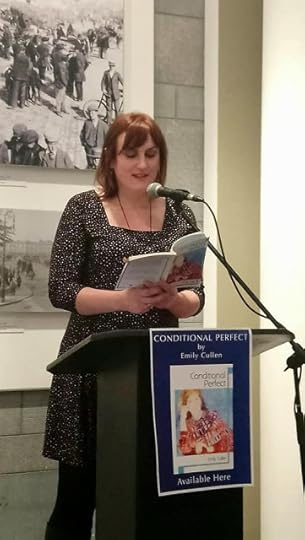 Reading poems from my new book
Reading poems from my new book My boys, Lee & Lorcan were on their best behaviour and did me proud
My boys, Lee & Lorcan were on their best behaviour and did me proud
 With my publishers, Lisa Frank & John Walsh of Doire Press
With my publishers, Lisa Frank & John Walsh of Doire Press
 With a great friend, Mairéad Roche
With a great friend, Mairéad Roche Launch of Conditional Perfect at Galway Museum on Saturday, 28 September
Launch of Conditional Perfect at Galway Museum on Saturday, 28 September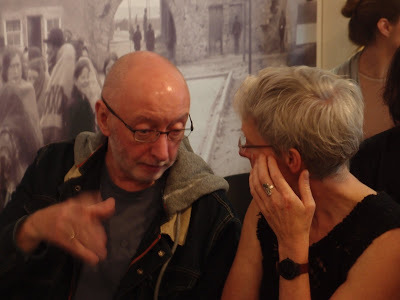 James Martyn Joyce & Aideen Henry among the crowd at the launch
James Martyn Joyce & Aideen Henry among the crowd at the launch
 Pat Carton and Pat McMahon at the launch
Pat Carton and Pat McMahon at the launch
Published on October 01, 2019 15:53
September 24, 2018
Last few days to register for 'Appreciation of Poetry' course
There are just a few days left to book for 'Appreciation of Poetry' - the evening course I will be teaching for the Centre for Adult Learning at NUI Galway again, starting in early October. The NUI Galway short courses booklet is linked here with course information on page 4 and a registration form at the back. Please spread the word!
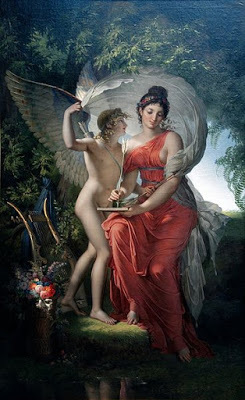 Erato, Muse of Lyric Poetry by Charles Meynier (1800)Here are what previous course participants said:"Friendly, informative approach, great poems chosen to illustrate course, the fact that the tutor is a poet and the handbook. Would definitely instill a love of/appreciation of poetry." "I thoroughly enjoyed the variety of themes presented and illustrated. We were challenged to enter into the spirit of the course. I was encouraged to write again after a pause of several years.""Our tutor was very encouraging as well as great fun! Access to poems from a variety of different poets – many of whom I had never heard of!""Enjoyed course very much. Teaching very engaging, passionate and encouraging. Relaxed, friendly atmosphere. Great to get emails from teacher, notes, slides, etc. and the half-time break!""This course was most interesting and a lot of fun. Each session was very well researched and presented.""The breadth of vision of the course and the teaching style of our lecturer. The classes were enlightening and fun."
Erato, Muse of Lyric Poetry by Charles Meynier (1800)Here are what previous course participants said:"Friendly, informative approach, great poems chosen to illustrate course, the fact that the tutor is a poet and the handbook. Would definitely instill a love of/appreciation of poetry." "I thoroughly enjoyed the variety of themes presented and illustrated. We were challenged to enter into the spirit of the course. I was encouraged to write again after a pause of several years.""Our tutor was very encouraging as well as great fun! Access to poems from a variety of different poets – many of whom I had never heard of!""Enjoyed course very much. Teaching very engaging, passionate and encouraging. Relaxed, friendly atmosphere. Great to get emails from teacher, notes, slides, etc. and the half-time break!""This course was most interesting and a lot of fun. Each session was very well researched and presented.""The breadth of vision of the course and the teaching style of our lecturer. The classes were enlightening and fun."
 Erato, Muse of Lyric Poetry by Charles Meynier (1800)Here are what previous course participants said:"Friendly, informative approach, great poems chosen to illustrate course, the fact that the tutor is a poet and the handbook. Would definitely instill a love of/appreciation of poetry." "I thoroughly enjoyed the variety of themes presented and illustrated. We were challenged to enter into the spirit of the course. I was encouraged to write again after a pause of several years.""Our tutor was very encouraging as well as great fun! Access to poems from a variety of different poets – many of whom I had never heard of!""Enjoyed course very much. Teaching very engaging, passionate and encouraging. Relaxed, friendly atmosphere. Great to get emails from teacher, notes, slides, etc. and the half-time break!""This course was most interesting and a lot of fun. Each session was very well researched and presented.""The breadth of vision of the course and the teaching style of our lecturer. The classes were enlightening and fun."
Erato, Muse of Lyric Poetry by Charles Meynier (1800)Here are what previous course participants said:"Friendly, informative approach, great poems chosen to illustrate course, the fact that the tutor is a poet and the handbook. Would definitely instill a love of/appreciation of poetry." "I thoroughly enjoyed the variety of themes presented and illustrated. We were challenged to enter into the spirit of the course. I was encouraged to write again after a pause of several years.""Our tutor was very encouraging as well as great fun! Access to poems from a variety of different poets – many of whom I had never heard of!""Enjoyed course very much. Teaching very engaging, passionate and encouraging. Relaxed, friendly atmosphere. Great to get emails from teacher, notes, slides, etc. and the half-time break!""This course was most interesting and a lot of fun. Each session was very well researched and presented.""The breadth of vision of the course and the teaching style of our lecturer. The classes were enlightening and fun."
Published on September 24, 2018 05:27
January 26, 2018
Interview about Cúirt in this weeks Galway Advertiser
Earlier this week,
Kernan Andrews
, Arts Editor & Political Correspondent of
The Galway Advertiser
, kindly invited me to an interview for the newspaper about my plans and vision as Programme Director of the
Cúirt International Festival of Literature
. Kernan and I had an enjoyable, wide-ranging conversation that lasted for over and hour and half, and the resulting piece has just been published on page 36 of this week's Galway Advertiser.
Thanks so much to Kernan for those great questions and for his editorial skill in compressing all we discussed into this article, which I hope you enjoy!
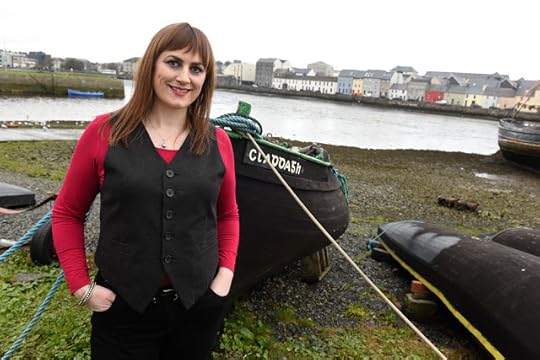 Photo: Boyd Challenger
Photo: Boyd Challenger
Thanks so much to Kernan for those great questions and for his editorial skill in compressing all we discussed into this article, which I hope you enjoy!
 Photo: Boyd Challenger
Photo: Boyd Challenger
Published on January 26, 2018 05:55
November 30, 2017
On the 50th anniversary of Patrick Kavanagh's Death
Patrick Kavanagh died on this day fifty years ago - 30th November 1967 - and I cannot let the day pass without paying my respects to him and pausing to reflect on one of my all-time favourite poets. For now, I'm just going to post one of his poems below, 'Innocence' and I am hopeful of finding a quiet moment to write more in the coming days about Kavanagh and his poetry and, specifically, about my memories of curating the programme of events for his centenary year, thirteen years ago, in 2004.
 Patrick Kavanagh saving the hay in 1934 with his sister, Josie and brother Peter
Patrick Kavanagh saving the hay in 1934 with his sister, Josie and brother PeterAs I move through a different phase of life now, with two small boys of my own and the wisdom of experience, Kavanagh's words remain radiant as ever. The poet's confidence in stating that 'love's doorway to life / is the same doorway everywhere' still resonates, as does his celebration of the everyday, the simple things and 'the placeless Heaven that's under all our noses'. Kavanagh urges us to pay attention; he said that 'to get to know even a small field is a lifetime's exploration'. The subject of 'Innocence' is the little field his mother purchased for him in 1926, which is still visible under Rocksavage Fort in Inniskeen. The reluctant farmer preferred to use the hedges as shelving for his books!
Nobody is laughing at Patrick's 'hungry hills' now. To those of you who have yet to visit Kavanagh Country, I would urge you to do so as soon as you can and, especially, to call into his former parish church, which is now the Patrick Kavanagh Rural and Literary Resource Centre. And if you are fortunate enough to encounter the very wonderful Rosaleen Kearney - Kavanagh expert and all-round exceptional human being - please give her my very best.
Innocence
They laughed at one I loved—
The triangular hill that hung
Under the Big Forth. They said
That I was bounded by the whitethorn hedges
Of the little farm and did not know the world.
But I knew that love's doorway to life
Is the same doorway everywhere.Ashamed of what I loved
I flung her from me and called her a ditch
Although she was smiling at me with violets.But now I am back in her briary arms
The dew of an Indian Summer morning lies
On bleached potato-stalks—
What age am I?I do not know what age I am,
I am no mortal age;
I know nothing of women,
Nothing of cities,
I cannot die
Unless I walk outside these whitethorn hedges.
Patrick Kavanagh
Published on November 30, 2017 15:59
September 27, 2017
Getting set to teach Appreciation of Poetry at NUI Galway again
Only a few days left - until this Friday - to book a place on the 'Appreciation of Poetry' course I'll be teaching for Adult Education at NUI, Galway, which starts next Tuesday, 3 October at 7pm. Contact Berna Morgan on 091-494055 to book your spot. Full details on page 6 of the NUI Galway Short Courses booklet here. Poems by a variety of Irish and international writers, including Louis MacNiece, William Carlos Williams, Pablo Neruda, Frank O’Hara, Elizabeth Bishop, Edna St. Vincent Millay, Paula Meehan and many others will be explored in a lively, informal atmosphere. Some of the themes addressed include: how poetry is made; the sonnet; the villanelle and forms of rhyme; poetry in free verse; language and vision in ekphrasis; image, nature and description in the haiku; poetry of common things and the antipoetic and spoken word. Let's put the adventure back in reading poetry; lets find the music and fun in prosody! Here's the inimitable Kim Addonizo doing just that:
Prosody PathetiqueTrochees tear your heart to tatters.
Lovers leave you broken, battered.
Fuck you, fuck off: spondees. So what.
Get high. Drop dead. Who cares. Life sucks.
Dactyls are you getting boozed in your underwear,
thinking of someone who used to be there.
These are iambs: Dolor. Despair.
And going on and on about your pain,
and sleeping pills, and dark and heavy rain.
Now for the anapests: in the end, you’re alone.
In the bag, in the dark; in a terrible rut.
With a smirk, in a wink, the wolves tear you apart.Kim Addonizio
Prosody PathetiqueTrochees tear your heart to tatters.
Lovers leave you broken, battered.
Fuck you, fuck off: spondees. So what.
Get high. Drop dead. Who cares. Life sucks.
Dactyls are you getting boozed in your underwear,
thinking of someone who used to be there.
These are iambs: Dolor. Despair.
And going on and on about your pain,
and sleeping pills, and dark and heavy rain.
Now for the anapests: in the end, you’re alone.
In the bag, in the dark; in a terrible rut.
With a smirk, in a wink, the wolves tear you apart.Kim Addonizio
Published on September 27, 2017 12:29
May 28, 2017
Exciting News: New Director of the Cúirt International Festival of Literature
We are on the cusp of June and I'm surprised to discover that I haven’t blogged in a full six months! Don’t consign me to the netherworld of dormant blogspot sites just yet though – I have some valid excuses for my absence on here! It’s been a a roller coaster of vicissitudes since the turn of the year, replete with health scares, the tragic loss of an old friend, and our two boys catching horrible flu viruses (we are all fine again, thankfully) but also with bright new career and extra-curricular opportunities. In March I was invited to be the Guest Editor of the next couple of issues of
The Weary Blues
- a neat online journal of literature and art founded by writer and digital humanities scholar, James O'Sullivan of New Binary Press. I’m thoroughly enjoying the range of themes and vibrant voices in all the work I’ve received to date. While our window for submissions for Issue 8 just closed last Friday (26 May), don’t worry if you missed this submission period as it will reopen for issue 9 anon. Keep an eye out here and on The Weary Blues website for further details soon.
Another development I'm excited to report relates to my professional life. After lovingly attending the Cúirt International Festival of Literature as an audience member for many years, (since I first came to Galway to study for my BA back in the early 1990s….ooops am I giving away my age now?), the planets have aligned, and I was appointed Programme Director of the very same festival last month. Cúirt has brought many joyful memories over the years, of hearing great authors read their work and interact with other writers, and then of getting to meet them in person as they signed books (see pic below), or spying literary luminaries such as J.M. Coetzee sauntering down Eglinton street in the afternoon during the festival week.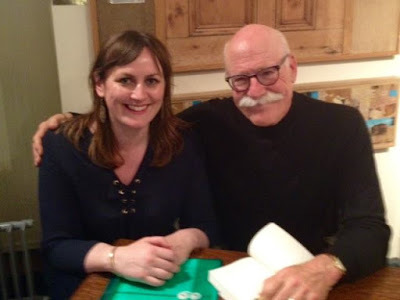 I had the pleasure of meeting Tobias Wolff at the 2016
I had the pleasure of meeting Tobias Wolff at the 2016
Cúirt International Festival of LiteratureIt is an honour to be appointed to this post and I’m already imagining new generative possibilities for the festival, new potential collaborations and interesting pairings of writers and interviewers, etc. (The Connaught Tribune published a short piece about my experience as an arts curator and recent appointment to Cúirt last month here.) So maybe now I can somewhat justify the citadel of books that is our home with blatant evidence of my sprees in Charlie Byrnes Bookshop, Kennys and the Book Depository overflowing in every nook and cranny of our house! My poor husband – also a bibliophile, but not as much of a book hoarder as me – is uncommonly forgiving and, thankfully, a great assembler of bookcases! Watch this space for gradual announcements of highlights for Cúirt 2018 (23-29 April) which I may be able to sneakily share with you on the QT over the coming months….!
Another development I'm excited to report relates to my professional life. After lovingly attending the Cúirt International Festival of Literature as an audience member for many years, (since I first came to Galway to study for my BA back in the early 1990s….ooops am I giving away my age now?), the planets have aligned, and I was appointed Programme Director of the very same festival last month. Cúirt has brought many joyful memories over the years, of hearing great authors read their work and interact with other writers, and then of getting to meet them in person as they signed books (see pic below), or spying literary luminaries such as J.M. Coetzee sauntering down Eglinton street in the afternoon during the festival week.
 I had the pleasure of meeting Tobias Wolff at the 2016
I had the pleasure of meeting Tobias Wolff at the 2016Cúirt International Festival of LiteratureIt is an honour to be appointed to this post and I’m already imagining new generative possibilities for the festival, new potential collaborations and interesting pairings of writers and interviewers, etc. (The Connaught Tribune published a short piece about my experience as an arts curator and recent appointment to Cúirt last month here.) So maybe now I can somewhat justify the citadel of books that is our home with blatant evidence of my sprees in Charlie Byrnes Bookshop, Kennys and the Book Depository overflowing in every nook and cranny of our house! My poor husband – also a bibliophile, but not as much of a book hoarder as me – is uncommonly forgiving and, thankfully, a great assembler of bookcases! Watch this space for gradual announcements of highlights for Cúirt 2018 (23-29 April) which I may be able to sneakily share with you on the QT over the coming months….!
Published on May 28, 2017 15:58
November 20, 2016
Busy this November - Harp Studies, Winter Warmer Weekend and History Ireland
November is hurtling past this year with loads happening! Normally, around this time, I’d be digging out my cosy socks, slippers, books to be read and reaching for the hot chocolate. This year, however, I’m not quite ready to hibernate! Perhaps all the unanticipated sunny weather we were blessed with in October has energized us more than usual for the short days of November.
The discussion around the 1916 centenary has gained momentum again in the final two months of the year. Last month I highlighted the poetic contributions of some of the leaders of the 1916 Rising in a talk about revolutionary poetry from Ireland and around the world at Galway City Museum. The event drew a lively audience and a vibrant post-talk discussion ensued. It was fascinating to hear Ndrek Gjini talk about his friend and fellow Albanian, the writer, Visar Zhiti and how prisoners memorised lines from Zhiti's poems, then how the poet himself, not allowed pen and paper in prison for twelve years, wrote furiously from memory upon his release. Thanks again to Ndrek for joining me in this presentation and thanks to everyone who attended and made the occasion a memorable one.
Still on the theme of 1916, I’m delighted to have an article focusing on the subject of flags flown during the Rising entitled ‘Summoning her children to which flag?’ in the current November/December issue of History Ireland magazine.
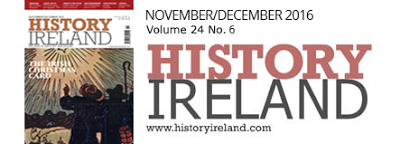
My piece questions why the popular national flag at the time of the Rising – the green harp flag – was not flown above the GPO. It addresses these issues by demonstrating that the tricolor came into increasing use at this time while the green harp flag accrued associations with the pro-Home Rule Parnellites and the British army recruitment drive for World War I.
Also in the realm of Irish cultural history, I am very pleased to have contributed a chapter to Harp Studies: perspectives on the Irish harp, the new book just released by Four Courts press, edited by Sandra Joyce and Helen Lawlor . Harp Studies brings together a diverse array of scholarship in a burgeoning field of enquiry. Taking an expansive view of the harp through history and music, the essays in this book individually engage with the variety of ways in which the harp has been interpreted and implicated in Irish culture, politics and music from the 9th century to the present day.
Harp Studies: perspectives on the Irish harp
Themes explored include iconography, reception history, diaspora, identity, spirituality and politics. My own chapter, entitled 'Tempering the stereotypes of Irishness abroad: the Irish harp as golden lever of temperance and respectability', explores some uses of harp iconography among Irish migrants in the nineteenth century and how the term 'harp' went on to become something of an ethnic slur for Irish Catholics in the latter half of the century. Harp Studieswill be launched in both Dublin and Limerick - in Dublin at the Irish Traditional Music Archives on Tuesday, 29 November at 6pm by Nicholas Carolan and on Wednesday, 30 November at 5pm by Prof. Paul McCutcheon in the foyer of the Irish World Academy Building, University of Limerick. All are welcome to attend both launches and the book is available to order from Four Courts press.

Onto the glorious subject of poetry now... Last month my poem 'Birthing' was published in Issue 8 of the online journal, The Irish Literary Review and you can read it in the 'Poetry' section here. This month, I was honoured to receive an invite to read at the fourth annual Winter Warmer Festival - a weekend of poetry - in Cork, which takes place next weekend on Friday, 25th and Saturday, 26th November. With a fantastic line up this year, as always, 22+ poets will read/perform over two days. The programme will also feature a selection of films from the Ó Bhéal Poetry-Film competition, Poetry in Performance Art, Poetry with Music and a closed-mic set for ten local poets. It all takes place at the Kino Cinema on Washington Street and all events are free of charge with donations gratefully accepted. Check out the full programme here. Hope to see you in Cork next weekend!
The discussion around the 1916 centenary has gained momentum again in the final two months of the year. Last month I highlighted the poetic contributions of some of the leaders of the 1916 Rising in a talk about revolutionary poetry from Ireland and around the world at Galway City Museum. The event drew a lively audience and a vibrant post-talk discussion ensued. It was fascinating to hear Ndrek Gjini talk about his friend and fellow Albanian, the writer, Visar Zhiti and how prisoners memorised lines from Zhiti's poems, then how the poet himself, not allowed pen and paper in prison for twelve years, wrote furiously from memory upon his release. Thanks again to Ndrek for joining me in this presentation and thanks to everyone who attended and made the occasion a memorable one.
Still on the theme of 1916, I’m delighted to have an article focusing on the subject of flags flown during the Rising entitled ‘Summoning her children to which flag?’ in the current November/December issue of History Ireland magazine.

My piece questions why the popular national flag at the time of the Rising – the green harp flag – was not flown above the GPO. It addresses these issues by demonstrating that the tricolor came into increasing use at this time while the green harp flag accrued associations with the pro-Home Rule Parnellites and the British army recruitment drive for World War I.
Also in the realm of Irish cultural history, I am very pleased to have contributed a chapter to Harp Studies: perspectives on the Irish harp, the new book just released by Four Courts press, edited by Sandra Joyce and Helen Lawlor . Harp Studies brings together a diverse array of scholarship in a burgeoning field of enquiry. Taking an expansive view of the harp through history and music, the essays in this book individually engage with the variety of ways in which the harp has been interpreted and implicated in Irish culture, politics and music from the 9th century to the present day.
Harp Studies: perspectives on the Irish harp
Themes explored include iconography, reception history, diaspora, identity, spirituality and politics. My own chapter, entitled 'Tempering the stereotypes of Irishness abroad: the Irish harp as golden lever of temperance and respectability', explores some uses of harp iconography among Irish migrants in the nineteenth century and how the term 'harp' went on to become something of an ethnic slur for Irish Catholics in the latter half of the century. Harp Studieswill be launched in both Dublin and Limerick - in Dublin at the Irish Traditional Music Archives on Tuesday, 29 November at 6pm by Nicholas Carolan and on Wednesday, 30 November at 5pm by Prof. Paul McCutcheon in the foyer of the Irish World Academy Building, University of Limerick. All are welcome to attend both launches and the book is available to order from Four Courts press.

Onto the glorious subject of poetry now... Last month my poem 'Birthing' was published in Issue 8 of the online journal, The Irish Literary Review and you can read it in the 'Poetry' section here. This month, I was honoured to receive an invite to read at the fourth annual Winter Warmer Festival - a weekend of poetry - in Cork, which takes place next weekend on Friday, 25th and Saturday, 26th November. With a fantastic line up this year, as always, 22+ poets will read/perform over two days. The programme will also feature a selection of films from the Ó Bhéal Poetry-Film competition, Poetry in Performance Art, Poetry with Music and a closed-mic set for ten local poets. It all takes place at the Kino Cinema on Washington Street and all events are free of charge with donations gratefully accepted. Check out the full programme here. Hope to see you in Cork next weekend!
Published on November 20, 2016 05:44
October 24, 2016
Shedding her Skin Like the Chameleon - An Interview with Geraldine Mills
The first author I'm delighted to interview for the new ‘featured writer’ section on my blog is multi award-winning poet, short-story writer and now novelist, Geraldine Mills. Galway-native, Geraldine has been a poet and short-story writer for many years and has already published several books.
Gold is her first novel, and her first book for children.
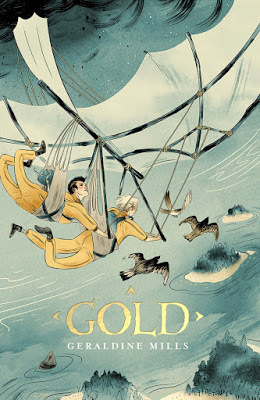 Gold
by Geraldine Mills - see below for a list of stockists
Gold
by Geraldine Mills - see below for a list of stockists
1. Hi Geraldine, thanks for taking the time for this interview. There is a popular perception that when poets aren’t writing poetry they are doing something else. As someone who is perhaps primarily known for poetry, and is now moving from short stories to the novel, can you tell me about how you see your identity as a writer changing with this move toward the longer narrative?
For me, story comes first; I am constantly looking for what is hidden behind an image, a piece of dialogue, a phrase that comes my way. I then have to be faithful to the genre that gives the greatest scope to that idea.
A writer must always be growing and developing, wherever that may take them. Otherwise they die. I have written novels before but they never saw the light of day and are now being worked over by worms in the compost bin. Gold is the first one to be published. Writing a novel, when you are not sure what you are doing, certainly moves you out of your comfort zone. The longer narrative is more demanding simply because of its size but when a writer is given the gift of an idea, it behoves him/her to tell it in the best medium possible. Gold had to be a novel; once I heard the voices of Starn and Esper that is what the story demanded.
One obvious difference I have seen since publication is that I have become more visible. Poetry has a much smaller audience and can often alienate rather than draw readers in. There is the misconception that it is a loftier calling, that a poet’s work is hermetically sealed and not accessible to them which is a great pity and not the case at all. People are happier to engage with me on the novel rather than they ever did with poetry. And of course, children now engage with me in a way they didn’t before. I am having a real adventure talking to schools, libraries and children’s book clubs. They are not afraid to ask why the story goes in a certain way or if I based a nasty character on Mr Trump. While my next project will be the longer narrative, there is a sequence of poems waiting in the wings as well as a number of short stories, crying out to be heard. Like the chameleon I will shed my skin and change genres depending very much on where the Muse sends me.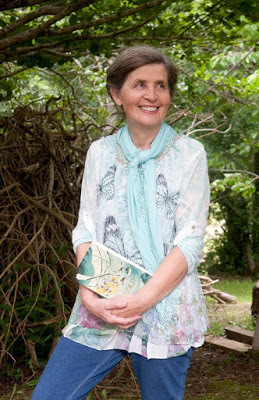 Geraldine Mills 2. That's an interesting insight, and sad, that poetry can be perceived as a 'hermetically sealed' space... Theme for a whole other discussion there I think... You marry digital culture, or the suggestion of it, very effectively with the natural world in the book in ways that many young adult readers will be able to identify with. For example, Esper and Starn ‘cloud-grab’ stories for their ‘E-pistles’, etc. Writing for a young adult audience for the first time must bring with it some unique challenges. Can you tell us something about how you prepared for engaging with young adult readers and for tapping into their particular frames of reference? What drew you to the Young Adult fiction sphere?
Geraldine Mills 2. That's an interesting insight, and sad, that poetry can be perceived as a 'hermetically sealed' space... Theme for a whole other discussion there I think... You marry digital culture, or the suggestion of it, very effectively with the natural world in the book in ways that many young adult readers will be able to identify with. For example, Esper and Starn ‘cloud-grab’ stories for their ‘E-pistles’, etc. Writing for a young adult audience for the first time must bring with it some unique challenges. Can you tell us something about how you prepared for engaging with young adult readers and for tapping into their particular frames of reference? What drew you to the Young Adult fiction sphere?
The only preparation was having already developed the discipline to go to the blank page and put one word after the other. Of course, 50,000 words is a longer piece of string than a haiku but I approached it in the same way as I do most of my writing by diving straight in, legs flapping, mouth and nose filling with water, not knowing what on earth I am doing but splashing away anyway. I see Goldmore as a preteen story rather than a young adult though all ages seem to be reading it. I was interested in working with a plot-driven story rather than a character-driven one and therefore ‘what happens next’ played a huge part in the unfolding of the narrative. The idea chose me rather than the other way around. I live on the edge of Connemara and one year a gorse fire on the mountain became completely out of control, burning everything in sight. When we walked those hills months later it looked like that little part of our world had been involved in some cataclysmic event. I tried to imagine the outcome if something more powerful hit us, something even more calamitous than the volcanic eruptions of Iceland that, in 2010, had forced our skies silent.
I had an abandoned children’s novel from about ten years previously. I played over and over again the possible scenario of taking the two boys in search of adventure from that unpublished story and time-travelling them into the future imaginary world of no trees or animals. When I got the image of the twins in pollination suits the plot began to take wings and I just followed.
Once I was on that path I started to read children’s books. I wasn’t sure if what I was doing was ever going to engage with my young audience. But I never let that stop me. I just got completely involved in the boys’ lives and went with it. The fact that children and adults like the story is a great joy to me.
3. There are many potent images in your book, like 'wand-swishing pollinators', that rise up like mini poems. There are also a few nice nods to the poetry universe. I would love to be able to spread 'Pindar' on my own bread, for example – it might help with my odes! I also notice that themes of weather, the environment, travel and flight occur in your poetry collections too. Did the story and images in Gold arrive as poetry initially or did you know from the outset that you would write a longer narrative?
There are a whole number of elements at play here. My love of nature and the environment are certainly themes that run through my work. But this never started out as a poem. All of those images were born as I was writing. I suppose by osmosis the poetic language seeped through. The most important task for me was to create a believable world: that of Orchard, something that was familiar to the boys but not to me, while the reverse happens in Part Two, The Islands, where my familiar world is alien to Starn and Esper. There was a certain amount of research as well as inventiveness needed to create that world.
There is no greater fun than to be the inventor of words and giving them a new meaning such as E-pistle and Visage or discovering harran bread which was used in the seventeenth century and is a mixture of barley and peas. There is also, as you rightly point out, the play on Pindar. It was great fun to discover that ‘pindar’ is also another word for peanut as is goober so I was able to bring that in. I was almost having too much fun with it all. Where I couldn’t find the word to describe what I wanted, I just made it up. One young boy who read it said that he liked not knowing straight away what a word meant but waited for it to reveal itself as the story went along.
Other parts of my research included visiting a cave, studying wolves in a reserve in Spain and taking a ride in a hot air balloon over Albuquerque. One day I was in Wooden Heart Stores in Galway and came across a cardboard kit of boys with parachutes. I bought it and made up two of the boys and hung them from the ceiling. That way I could visualise them as I was writing the flight scene.
4. Oooh lovely idea! Wooden Heart is certainly an inspiring shop.. As a poet moving into the larger space of the novel, can I ask about how your technique developed? For example, how did you find the experience of crafting dialogue and threading the narratives together? Was it similar to the way you approach your poetry or was it an altogether different process?
I forget who said that you write a novel in the same way you eat an elephant: bite by bite. This was a very different process; here I was working with a plot-driven structure as opposed to the character-driven narrative of a short story or the developing levels of a poem. Without the expert guidance of Siobhan Parkinson and Gráinne Clear at Little Island, it would not be the book it is today. I was working in the dark, some passages were too long, too poetic, structurally, there were big holes in it. Siobhán and Gráinne held my hand and got me to write and rewrite until it was more cohesive, the tone and the pace balanced and the dialogue was doing its job when it needed to by moving the story along. And then something magical happened and it all came together. That’s the alchemy of writing that give me the real buzz and keeps me going as I wallpaper the bathroom with rejection slips.
5. There are interesting examples in Gold of self-reliance, critical thinking, resilience and hope winning out over antagonistic forces. For example, Starn overcomes much adversity with the help of his tiny talisman, General Yacobe, and the memories of his mother’s advice and his father’s kindness. He resists becoming brutalized and keeps his promise never to inflict harm on another. Do you think there is a need now, perhaps more than ever, to inscribe a note of hope and to offer positive perspectives in YA fiction?
Social realism in YA fiction is something that has really taken off in the last number of years with such hard hitting themes as racism, discrimination, disability. Because I wanted to reach a younger audience, I was writing an adventure story rather than a social commentary and any issues of hardship that come through in the story, I wanted to be hinted at rather than being the main nub of the story. I also wanted it to have the elements of a classic adventure story where things come good at the end.
There should always be hope. I would have found it very difficult to have written a completely dystopian story as I always look for the chink of light in the bleakest of situations. A child who is resilient will overcome all obstacles. Of course I didn’t deliberately build in those tenets but they came from the characters themselves. I also believe in the innate goodness of the human spirit and that is why the story goes from the darkness of Orchard and the Sagittars to the light of the islands. In my poetry collection Urgency of Stars, published by Arlen House in 2011, the very last words in the book are: ‘It all comes down to light’. I want to keep that burning in the hearts of all readers.
6. Yes, I completely agree with you about the need for hope. Lastly, on a totally different note now, it’s desert island disc time. Can you name a few of your favourite writers and tell us what you enjoy most about their work?
Beloved by Toni Morrison that continues to haunt me years after reading it.
Anything by Colum McCann but especially Thirteen ways of Looking.
It must be something to do with hauntings, Michael Mc Cormack Solar Bones, a beautifully written book, mature and full of risk-taking that works. Deserving of being shortlisted for the Goldsmith Award.
The Book of Embracesby Eduardo Galeano, a gift from Alan McMonagle and I love its magical realism and the use of drawings that give the pages wings.
Thank you very much Geraldine and I wish you every success with Gold!
My great pleasure, Emily. It is you I should thank for taking the time to prepare all these questions.
Goldby Geraldine Mills is available at all good bookstores and online at the following: Kenny's, Little Island Books, Dubray Books, Charlie Byrne's and the Book Depository.
Gold is her first novel, and her first book for children.
 Gold
by Geraldine Mills - see below for a list of stockists
Gold
by Geraldine Mills - see below for a list of stockists1. Hi Geraldine, thanks for taking the time for this interview. There is a popular perception that when poets aren’t writing poetry they are doing something else. As someone who is perhaps primarily known for poetry, and is now moving from short stories to the novel, can you tell me about how you see your identity as a writer changing with this move toward the longer narrative?
For me, story comes first; I am constantly looking for what is hidden behind an image, a piece of dialogue, a phrase that comes my way. I then have to be faithful to the genre that gives the greatest scope to that idea.
A writer must always be growing and developing, wherever that may take them. Otherwise they die. I have written novels before but they never saw the light of day and are now being worked over by worms in the compost bin. Gold is the first one to be published. Writing a novel, when you are not sure what you are doing, certainly moves you out of your comfort zone. The longer narrative is more demanding simply because of its size but when a writer is given the gift of an idea, it behoves him/her to tell it in the best medium possible. Gold had to be a novel; once I heard the voices of Starn and Esper that is what the story demanded.
One obvious difference I have seen since publication is that I have become more visible. Poetry has a much smaller audience and can often alienate rather than draw readers in. There is the misconception that it is a loftier calling, that a poet’s work is hermetically sealed and not accessible to them which is a great pity and not the case at all. People are happier to engage with me on the novel rather than they ever did with poetry. And of course, children now engage with me in a way they didn’t before. I am having a real adventure talking to schools, libraries and children’s book clubs. They are not afraid to ask why the story goes in a certain way or if I based a nasty character on Mr Trump. While my next project will be the longer narrative, there is a sequence of poems waiting in the wings as well as a number of short stories, crying out to be heard. Like the chameleon I will shed my skin and change genres depending very much on where the Muse sends me.
 Geraldine Mills 2. That's an interesting insight, and sad, that poetry can be perceived as a 'hermetically sealed' space... Theme for a whole other discussion there I think... You marry digital culture, or the suggestion of it, very effectively with the natural world in the book in ways that many young adult readers will be able to identify with. For example, Esper and Starn ‘cloud-grab’ stories for their ‘E-pistles’, etc. Writing for a young adult audience for the first time must bring with it some unique challenges. Can you tell us something about how you prepared for engaging with young adult readers and for tapping into their particular frames of reference? What drew you to the Young Adult fiction sphere?
Geraldine Mills 2. That's an interesting insight, and sad, that poetry can be perceived as a 'hermetically sealed' space... Theme for a whole other discussion there I think... You marry digital culture, or the suggestion of it, very effectively with the natural world in the book in ways that many young adult readers will be able to identify with. For example, Esper and Starn ‘cloud-grab’ stories for their ‘E-pistles’, etc. Writing for a young adult audience for the first time must bring with it some unique challenges. Can you tell us something about how you prepared for engaging with young adult readers and for tapping into their particular frames of reference? What drew you to the Young Adult fiction sphere?The only preparation was having already developed the discipline to go to the blank page and put one word after the other. Of course, 50,000 words is a longer piece of string than a haiku but I approached it in the same way as I do most of my writing by diving straight in, legs flapping, mouth and nose filling with water, not knowing what on earth I am doing but splashing away anyway. I see Goldmore as a preteen story rather than a young adult though all ages seem to be reading it. I was interested in working with a plot-driven story rather than a character-driven one and therefore ‘what happens next’ played a huge part in the unfolding of the narrative. The idea chose me rather than the other way around. I live on the edge of Connemara and one year a gorse fire on the mountain became completely out of control, burning everything in sight. When we walked those hills months later it looked like that little part of our world had been involved in some cataclysmic event. I tried to imagine the outcome if something more powerful hit us, something even more calamitous than the volcanic eruptions of Iceland that, in 2010, had forced our skies silent.
I had an abandoned children’s novel from about ten years previously. I played over and over again the possible scenario of taking the two boys in search of adventure from that unpublished story and time-travelling them into the future imaginary world of no trees or animals. When I got the image of the twins in pollination suits the plot began to take wings and I just followed.
Once I was on that path I started to read children’s books. I wasn’t sure if what I was doing was ever going to engage with my young audience. But I never let that stop me. I just got completely involved in the boys’ lives and went with it. The fact that children and adults like the story is a great joy to me.
3. There are many potent images in your book, like 'wand-swishing pollinators', that rise up like mini poems. There are also a few nice nods to the poetry universe. I would love to be able to spread 'Pindar' on my own bread, for example – it might help with my odes! I also notice that themes of weather, the environment, travel and flight occur in your poetry collections too. Did the story and images in Gold arrive as poetry initially or did you know from the outset that you would write a longer narrative?
There are a whole number of elements at play here. My love of nature and the environment are certainly themes that run through my work. But this never started out as a poem. All of those images were born as I was writing. I suppose by osmosis the poetic language seeped through. The most important task for me was to create a believable world: that of Orchard, something that was familiar to the boys but not to me, while the reverse happens in Part Two, The Islands, where my familiar world is alien to Starn and Esper. There was a certain amount of research as well as inventiveness needed to create that world.
There is no greater fun than to be the inventor of words and giving them a new meaning such as E-pistle and Visage or discovering harran bread which was used in the seventeenth century and is a mixture of barley and peas. There is also, as you rightly point out, the play on Pindar. It was great fun to discover that ‘pindar’ is also another word for peanut as is goober so I was able to bring that in. I was almost having too much fun with it all. Where I couldn’t find the word to describe what I wanted, I just made it up. One young boy who read it said that he liked not knowing straight away what a word meant but waited for it to reveal itself as the story went along.
Other parts of my research included visiting a cave, studying wolves in a reserve in Spain and taking a ride in a hot air balloon over Albuquerque. One day I was in Wooden Heart Stores in Galway and came across a cardboard kit of boys with parachutes. I bought it and made up two of the boys and hung them from the ceiling. That way I could visualise them as I was writing the flight scene.
4. Oooh lovely idea! Wooden Heart is certainly an inspiring shop.. As a poet moving into the larger space of the novel, can I ask about how your technique developed? For example, how did you find the experience of crafting dialogue and threading the narratives together? Was it similar to the way you approach your poetry or was it an altogether different process?
I forget who said that you write a novel in the same way you eat an elephant: bite by bite. This was a very different process; here I was working with a plot-driven structure as opposed to the character-driven narrative of a short story or the developing levels of a poem. Without the expert guidance of Siobhan Parkinson and Gráinne Clear at Little Island, it would not be the book it is today. I was working in the dark, some passages were too long, too poetic, structurally, there were big holes in it. Siobhán and Gráinne held my hand and got me to write and rewrite until it was more cohesive, the tone and the pace balanced and the dialogue was doing its job when it needed to by moving the story along. And then something magical happened and it all came together. That’s the alchemy of writing that give me the real buzz and keeps me going as I wallpaper the bathroom with rejection slips.
5. There are interesting examples in Gold of self-reliance, critical thinking, resilience and hope winning out over antagonistic forces. For example, Starn overcomes much adversity with the help of his tiny talisman, General Yacobe, and the memories of his mother’s advice and his father’s kindness. He resists becoming brutalized and keeps his promise never to inflict harm on another. Do you think there is a need now, perhaps more than ever, to inscribe a note of hope and to offer positive perspectives in YA fiction?
Social realism in YA fiction is something that has really taken off in the last number of years with such hard hitting themes as racism, discrimination, disability. Because I wanted to reach a younger audience, I was writing an adventure story rather than a social commentary and any issues of hardship that come through in the story, I wanted to be hinted at rather than being the main nub of the story. I also wanted it to have the elements of a classic adventure story where things come good at the end.
There should always be hope. I would have found it very difficult to have written a completely dystopian story as I always look for the chink of light in the bleakest of situations. A child who is resilient will overcome all obstacles. Of course I didn’t deliberately build in those tenets but they came from the characters themselves. I also believe in the innate goodness of the human spirit and that is why the story goes from the darkness of Orchard and the Sagittars to the light of the islands. In my poetry collection Urgency of Stars, published by Arlen House in 2011, the very last words in the book are: ‘It all comes down to light’. I want to keep that burning in the hearts of all readers.
6. Yes, I completely agree with you about the need for hope. Lastly, on a totally different note now, it’s desert island disc time. Can you name a few of your favourite writers and tell us what you enjoy most about their work?
Beloved by Toni Morrison that continues to haunt me years after reading it.
Anything by Colum McCann but especially Thirteen ways of Looking.
It must be something to do with hauntings, Michael Mc Cormack Solar Bones, a beautifully written book, mature and full of risk-taking that works. Deserving of being shortlisted for the Goldsmith Award.
The Book of Embracesby Eduardo Galeano, a gift from Alan McMonagle and I love its magical realism and the use of drawings that give the pages wings.
Thank you very much Geraldine and I wish you every success with Gold!
My great pleasure, Emily. It is you I should thank for taking the time to prepare all these questions.
Goldby Geraldine Mills is available at all good bookstores and online at the following: Kenny's, Little Island Books, Dubray Books, Charlie Byrne's and the Book Depository.
Published on October 24, 2016 08:10

